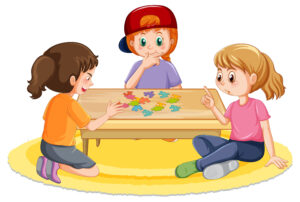The idea of “Sharing is Caring” is taught to young children in various ways to help them understand it deeply. This feeling is important because it makes them emotionally richer for life. Learning to be empathetic is the first step in helping children become good people.
The best way to teach kids about sharing is through play. When we show children examples, they learn more effectively. At Cambridge Kinderland, the experienced staff use games like passing the parcel and exchanging things to teach this positive behavior.
“There is no joy in possession without sharing.”
– Erasmus
Why is sharing important?
Sharing brings joy. It is a key skill for kids to play and learn with others. It teaches empathy and helps build social skills needed for adulthood. The habit of sharing develops over many years, so it’s never too early to start teaching your child that sharing is caring. When someone shares with others, it shows they care about them.
- Learning “Sharing is Caring” Through Play
Playing games is a great way to teach kids about sharing. Have siblings (or your child and another person) play a game where they need to work together or share a toy to reach a goal. This will show them that sharing can be fun and helps everyone.
2. Turn-Based Games
Play easy turn-based games like Hide and Seek, Snakes and Ladders or puzzle- games to show taking turns.
3. Giving Flowers with a Smile
Give your child some flowers and ask them to share with everyone in the room. Seeing people’s smiles and hearing their thank-yous will show them that sharing brings happiness.
4. Choose Your Turn Wisely
Very young children struggle to understand sharing and being kind. They’ve just learned what belongs to them and now have to give those things away. Kids can’t really empathize with others until they’re about two or three, so it’s pointless to try to explain other kids’ feelings before then. However, you can start early by playing simple ‘My Turn, Your Turn’ games to help them get used to sharing without getting upset when another child takes their things.
5. Respect Treasured Possessions
Everyone has items they don’t want to share, no matter their age. Forcing your child to share everything can make them dislike sharing, so respect that some toys and belongings are off-limits. If a friend is coming over, talk to your child beforehand about which toys they’re okay sharing and which are special. For siblings, sit them down to discuss which toys are shared and which are personal. This way, special toys can be put away, and conflicts can be avoided.
6. Use Your Words
When your child is old enough, talk to them about the feelings involved in sharing and help them understand others’ perspectives. Instead of scolding them for not sharing, ask why they don’t want to and how it might make other children feel. Be sure to praise them a lot when they share on their own.
7. Activities for “Sharing is Caring”
Pick activities like building with blocks or doing arts and crafts that require sharing materials.
Sharing helps children understand compromise and fairness. They learn that giving a little to others can also get some of what they want. This lesson is important for their future.
Sharing is crucial for getting along with others, especially when they start school. It helps them adjust and adapt to the world around them.


Add Comment